
llmops-duke-aipi
Official curricula for the LLMOPs course at Duke University
Stars: 73
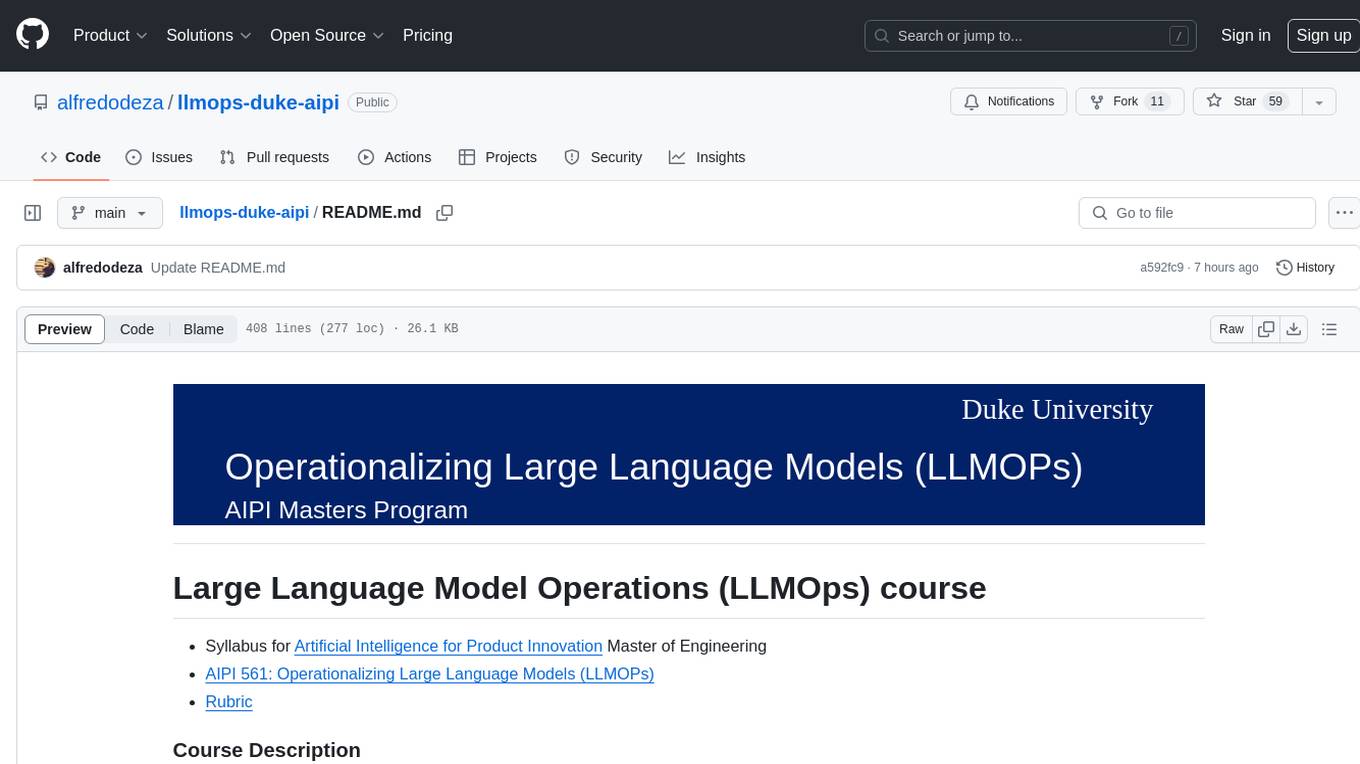
LLMOps Duke AIPI is a course focused on operationalizing Large Language Models, teaching methodologies for developing applications using software development best practices with large language models. The course covers various topics such as generative AI concepts, setting up development environments, interacting with large language models, using local large language models, applied solutions with LLMs, extensibility using plugins and functions, retrieval augmented generation, introduction to Python web frameworks for APIs, DevOps principles, deploying machine learning APIs, LLM platforms, and final presentations. Students will learn to build, share, and present portfolios using Github, YouTube, and Linkedin, as well as develop non-linear life-long learning skills. Prerequisites include basic Linux and programming skills, with coursework available in Python or Rust. Additional resources and references are provided for further learning and exploration.
README:
- Syllabus for Artificial Intelligence for Product Innovation Master of Engineering
- AIPI 561: Operationalizing Large Language Models (LLMOPs)
- Rubric
In this course, you will learn about the methodologies involved in operationalizing Large Language Models. By the end of the course, you will be able to develop applications that use software development best practices with large language models.
Faculty
Table of Contents
- Prerequisites
- Week 1: Introduction to Generative AI Concepts
- Week 2: Setup Development Environment
- Week 3: Interacting with Large Language Models
- Week 4: Using Local Large Language Models
- Week 5: Applied Solutions with LLMs
- Week 6: Extensibility Using Plugins and Functions
- Week 7: Using Retrieval Augmented Generation
- Week 8: Introduction to Python Web Frameworks for APIs
- Week 9: DevOps Principles
- Week 10: Deploying Machine Learning APIs
- Week 11: LLM Platforms
- Week 12: Final Presentations
By the end of the course, you will be able to:
- Build Large Language Model (LLM) or Small Language Model (SLM) solutions
- Build, share and present compelling portfolios using: Github, YouTube, and Linkedin.
- Setup a provisioned project environment
- Develop a non-linear life-long learning skill
[!NOTE] Diversity Statement: As educators and learners, we must share a commitment to diversity and equity, removing barriers to education so that everyone may participate fully in the community. In this course, we respect and embrace the unique experiences that brought each person here, including backgrounds, identities, learning styles, ways of expression, and academic interests. The broad spectrum of perspectives represented by our students enrich everyone’s experiences, and we strive to meet each perspective with openness and respect.
This course requires basic Linux and programming skills. You can complete all coursework with either Python or Rust. Use the following recommendations to get up to speed on these skills.
Linux If students lack basic Linux skills it is recommended to take this course: Duke+Coursera: Python, Bash and SQL Essentials for Data Engineering Specialization
[!IMPORTANT] You don't need both programming languages for this course, you can pick either or.
Python
These two modules from the Introduction to Python course covers the basics of Python:
- Python Essentials for MLOps-Week1-Introduction to Python
- Python Essentials for MLOps-Week2-Python Functions and Classes
Rust
This course on Rust Fundamentals covers the basics of the Rust Programming Language.
Although this course is based on the Large Language Model Operations (LLMOPs) specialization, you can use these additional resources as supporting material:
Courses:
- Duke+Coursera: Large Language Model Operations (LLMOps) Specialization
- Duke+Coursera: MLOps, Machine Learning Operations Specialization
- Rust Programming Specialization
- Duke+Coursera: Cloud Computing for Data Coursera Course
Books:
These are all the resources you need for this course.
[!IMPORTANT] You are not required to watch and read every single resource. You aren't graded on consumption of content or memorization of facts. Use the content as support for your project.
Rust:
Python:
- Python Essentials for MLOps-Week1-Introduction to Python
- Python Essentials for MLOps-Week2-Python Functions and Classes
- Python Essentials for MLOps-Week4-Introduction to Pandas and NumPy
- Introduction to Generative AI
- Public Speaking
- Developing Effective Technical Communication
- Exploring Cloud Onboarding
Weekly Demo video prompt: Discuss your plan and idea to build out your individual project and how you will do them on time. Use the Public Speaking guidelines to make sure you are delivering great demos.
Python:
- Python Development Environments_
- Pytest Master Class
- Python Essentials for MLOps-Week5-Applied Python for MLOps
Rust:
Weekly Demo video prompt: Describe your programming language choice and what are some of the advantages and potential pitfalls.
- Interacting with models
- Building robust Generative AI systems
- Introduction to MLOps Walkthrough
- MLOPs Foundations: Chapter 2 Walkthrough of Practical MLOps
- Chapter 1: Introduction to MLOps
- Chapter 2. MLOps Foundations
Weekly Demo video prompt: Explain what are some challenges for your application when working with Large Language Model output and what you will do to mitigate them.
- Beginning Llamafile for Local Large Language Models (LLMs)
- Getting Started with Open Source Ecosystem
- Foundations of Local Large Language Models
Weekly Demo video prompt: Describe your evaluation of the different Local Large Language and Small Language Models available with Llamafile and which one would work best for your project.
- Local LLMOps
- AI Pair Programming from CodeWhisperer to Prompt Engineering
- Using Local LLMs from Llamafile to Whisper.cpp
- Open Source Platforms for MLOps-Week2-Introduction to Hugging Face
- Open Source Platforms for MLOps-Week3-Deploying Hugging Face
- Open Source Platforms for MLOps-Week4-Applied Hugging Face
Weekly Demo video prompt: Explain the architectural overview of your application and what are some challenges with this type of design.
- Extending with Functions and Plugins
- Applications of LLMs
- MLOps Platforms: Amazon SageMaker and Azure ML-Week1
Weekly Demo video prompt: What are some benefits of adding plugins and functions to your application idea? What would be a challenge in a production environment?
Weekly Demo video prompt: How would adding RAG to your application affect the overall experience for an end user? Why or why wouldn't you consider using RAG in your application?
- Introduction to FastAPI Framework
- Introduction to Flask Framework
- Applied Python for MLOPs
- Cloud Virtualization, Containers and APIs
Weekly Demo video prompt: What are some benefits of using the framework you chose? Describe how you will make it work with your application.
- Responsible Generative AI
- Applying DevOps Principles
- MLOps Platforms: Amazon SageMaker and Azure ML-Week2
- MLOps Platforms: Amazon SageMaker and Azure ML-Week3
Weekly Demo video prompt: How would you apply DevOps, Responsible AI Principles, and automation for your application? What are some challenges you may face?
Weekly Demo video prompt: What are some difficulties of using automation? How will using automation benefit your application?
- Introduction to LLMOps with Azure
- mlflow-project-best-practices
- MLOps Platforms From Zero: Databricks, MLFlow/MLRun/SKLearn
- Azure Databricks, Pandas, and Opendatasets
- MLOps Platforms: Amazon SageMaker and Azure ML-Week5
- MLOps Platforms: Amazon SageMaker and Azure ML-Week4
Weekly Demo video prompt: How would adding a cloud platform enable your application? What are some potential drawbacks in using an LLM platform?
- Turn in Final Project
This class is based on a single and individual class project. You will start work on this project from Week 1 and will deliver the completed project with final presentation on Week 12.
See the rubric for more details.
[!IMPORTANT] Do not build a model yourself. Reuse a LLM or an SLM model. Use Mozilla Llamafile as a reference.
The primary two resources you will need to build an LLM solution using a local API are these:
- Beginning Llamafile for Local Large Language Models (LLMs)
- Getting Started with Open Source Ecosystem
- Python MLOps Cookbook
- databricks-zero-to-mlops
- Python Fire
- Refactoring a Python script into a library called by Python Click CLI
- Container Continuous Delivery
- Functions to Containerized Microservice Continuous Delivery to AWS App Runner with Fast API
- mlflow-project-best-practices
- databricks-zero-to-mlops
- Python MLOps Cookbook
- Edge Computer Vision
- Github Codespaces
- AWS Academy
- Azure for Students
- Google Qwiklabs
- Practical MLOps
- Pragmatic AI
- AWS Bootcamp
- Gift, N (2020) Python for DevOps Sebastopol, CA: O'Reilly.
- Gift, N (2021) Practical MLOps, Sebastopol, CA: O'Reilly
- Gift, N (2021) Cloud Computing for Data Analysis
- Gift, N (2020) Pragmatic AI: An Introduction to Cloud-Based Machine Learning
- AWS Training & Certification
- AWS Educate
- AWS Academy
- Google Qwiklabs - Hands-On Cloud Training
- Coursera
- Microsoft Learn
- edX
- Applied Computer Vision with Python Lectures: https://learning.oreilly.com/videos/applied-computer-vision/60652VIDEOPAIMLL/
- Learn Python in One Hour: https://learning.oreilly.com/videos/learn-python-in/60645VIDEOPAIML/
- Cloud Computing with Python: https://learning.oreilly.com/videos/cloud-computing-with/60650VIDEOPAIML/
- Python for Data Science with Colab and Pandas in One Hour: https://learning.oreilly.com/videos/python-for-data/62062021VIDEOPAIML/
- GCP Cloud Functions:
https://learning.oreilly.com/videos/learn-gcp-cloud/50101VIDEOPAIML/ - Azure AutoML
https://learning.oreilly.com/videos/learn-azure-ml/50104VIDEOPAIML/
- AWS Cloud Practitioner
- AWS ML
- AWS SA
-
Building AI Applications with GCP: https://learning.oreilly.com/videos/building-ai-applications/9780135973462/
-
Build GCP Cloud Functions:
https://learning.oreilly.com/videos/learn-gcp-cloud/50101VIDEOPAIML/
- Data Science, Pandas, and Colab
https://learning.oreilly.com/videos/python-for-data/62062021VIDEOPAIML/
- Python and DevOps
https://learning.oreilly.com/videos/python-devops-in/61272021VIDEOPAIML/ - Python Command-line Tools
https://learning.oreilly.com/videos/learn-python-command-line/50102VIDEOPAIML/
-
Docker containers:
https://learning.oreilly.com/videos/learn-docker-containers/50103VIDEOPAIML/ -
Learn the Vim Text Editor:
https://learning.oreilly.com/videos/learn-vim-in/50100VIDEOPAIML/
Grading and feedback turnaround will be one week from the due date. You will be notified if the turnaround will be longer than one week.
The discussion forums, written assignments, demo videos, and final project will be graded based on specific criteria or a rubric. The criteria or rubric for each type of assessment will be available in the course. To view the discussion forum rubric, click the gear icon in the upper right corner of the page and choose Show Rubric. The Written Assignment Rubric and Final Project Rubric will automatically appear on the page.
Late work will be accepted only in the event of an instructor-approved absence. Contact your instructor as soon as possible, at least 24 hours in advance.
The purpose of the discussion boards is to allow students to freely exchange ideas. It is imperative to remain respectful of all viewpoints and positions and, when necessary, agree to respectfully disagree. While active and frequent participation is encouraged, cluttering a discussion board with inappropriate, irrelevant, or insignificant material will not earn additional points and may result in receiving less than full credit. Frequency matters, but contributing content that adds value is paramount. Please remember to cite all sources—when relevant—in order to avoid plagiarism. Please post your viewpoints first and then discuss others’ viewpoints.
The quality of your posts and how others view and respond to them are the most valued. A single statement mostly implying “I agree” or “I do not agree” is not counted as a post. Explain, clarify, politely ask for details, provide details, persuade, and enrich communications for a great discussion experience. Please note, there is a requirement to respond to at least two fellow class members’ posts. Also, remember to cite all sources—when relevant—in order to avoid plagiarism.
Beyond interacting with your instructor and peers in discussions, you will be expected to communicate by Canvas message, email, and sync session. Your instructor may also make themselves available by phone or text. In all contexts, keep your communication professional and respect the instructor’s posted availability.
Just as you expect a response when you send a message to your instructor, please respond promptly when your instructor contacts you. Your instructor will expect a response within two business days. This will require that you log into the course site regularly and set up your notifications to inform you when the instructor posts an announcement, provides feedback on work or sends you a message.
This course will not meet at a particular time each week. All course goals, session learning objectives, and assessments are supported through classroom elements that can be accessed at any time. To measure class participation (or attendance), your participation in threaded discussion boards is required, graded, and paramount to your success in this course. Please note that any scheduled synchronous meetings are optional. While your attendance is highly encouraged, it is not required and you will not be graded on your attendance or participation.
This course will involve a number of different types of interactions. These interactions will take place primarily through Microsoft Teams. Please take the time to navigate through the course and become familiar with the course syllabus, structure, and content and review the list of resources below.
Students in an online program should be able to do the following:
- Communicate Teams discussion forums.
- Use web browsers and navigate the World Wide Web.
- Use the learning management system Teams.
- Use Teams
- Use applications to create documents and presentations (e.g., Microsoft Word, PowerPoint).
- Use applications to share files (e.g., Box, Google Drive).
In order to be successful in an online course, students should be able to locate, evaluate, apply, create, and communicate information using technology.
Students in this online course should be able to do the following:
- Create, name, compose, upload, and attach documents.
- Download, modify, upload, attach document templates.
- Create, name, design, and upload presentations.
- Access and download Course Reserve readings; read and review PDF documents.
- Access and use a digital textbook.
- Record and upload video taken with a webcam or smartphone.
- Use the library website for scholarly research tasks.
- Search the Internet strategically and assess the credibility of Internet sources.
- Participate in threaded discussions by contributing text responses, uploading images, sharing links.
- Coordinate remote work with peers, which may include contacting each other by e-mail, phone, video conference, or shared document.
- Edit and format pages in the course site using a WYSIWIG (What You See is What You Get) editor or basic HTML.
- Using a quizzing tool to answer multiple choice, true/false, matching, and short response questions within a given time period.
- Follow directions to engage with a remote proctor by text, webcam, and audio.
- Use a video player to review content, including pausing and restarting video.
You may want to complement this course with the following certifications:
For Tasks:
Click tags to check more tools for each tasksFor Jobs:
Alternative AI tools for llmops-duke-aipi
Similar Open Source Tools

llmops-duke-aipi
LLMOps Duke AIPI is a course focused on operationalizing Large Language Models, teaching methodologies for developing applications using software development best practices with large language models. The course covers various topics such as generative AI concepts, setting up development environments, interacting with large language models, using local large language models, applied solutions with LLMs, extensibility using plugins and functions, retrieval augmented generation, introduction to Python web frameworks for APIs, DevOps principles, deploying machine learning APIs, LLM platforms, and final presentations. Students will learn to build, share, and present portfolios using Github, YouTube, and Linkedin, as well as develop non-linear life-long learning skills. Prerequisites include basic Linux and programming skills, with coursework available in Python or Rust. Additional resources and references are provided for further learning and exploration.
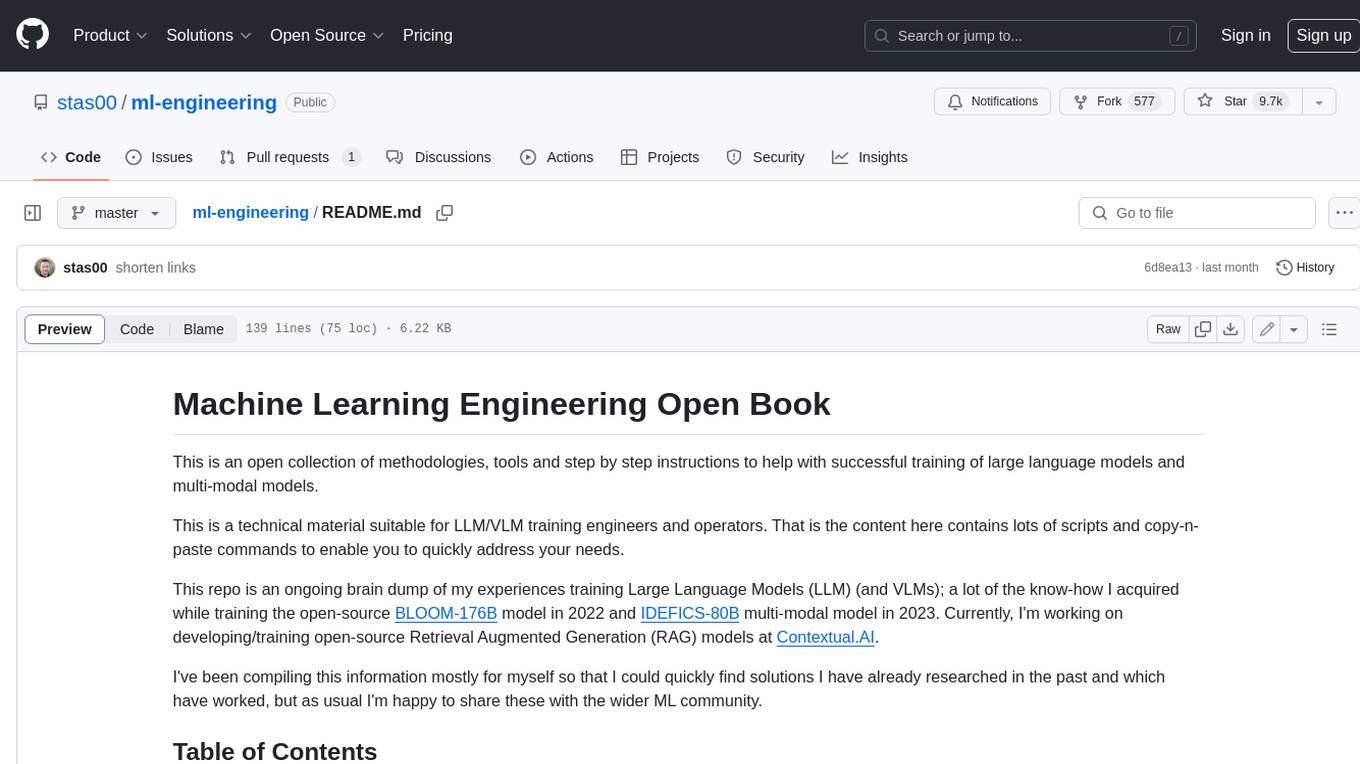
ml-engineering
This repository provides a comprehensive collection of methodologies, tools, and step-by-step instructions for successful training of large language models (LLMs) and multi-modal models. It is a technical resource suitable for LLM/VLM training engineers and operators, containing numerous scripts and copy-n-paste commands to facilitate quick problem-solving. The repository is an ongoing compilation of the author's experiences training BLOOM-176B and IDEFICS-80B models, and currently focuses on the development and training of Retrieval Augmented Generation (RAG) models at Contextual.AI. The content is organized into six parts: Insights, Hardware, Orchestration, Training, Development, and Miscellaneous. It includes key comparison tables for high-end accelerators and networks, as well as shortcuts to frequently needed tools and guides. The repository is open to contributions and discussions, and is licensed under Attribution-ShareAlike 4.0 International.
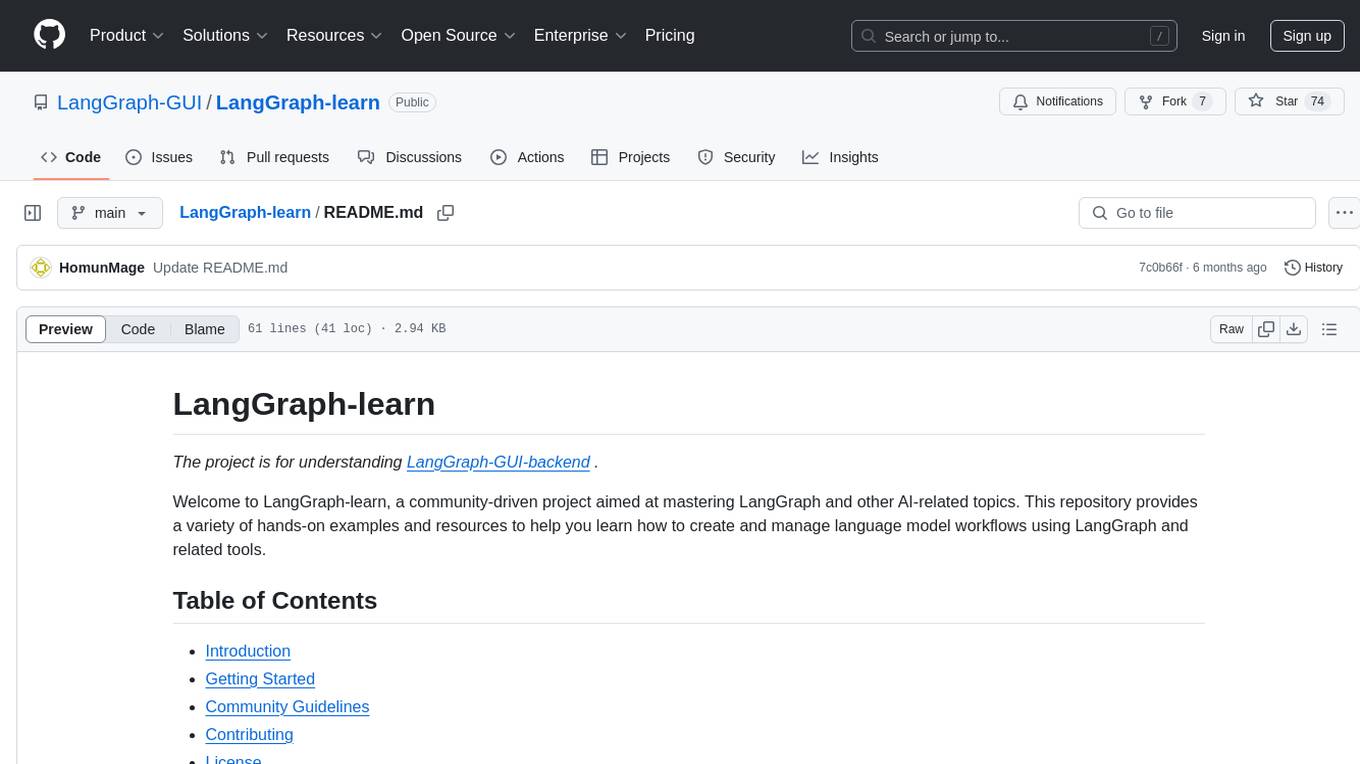
LangGraph-learn
LangGraph-learn is a community-driven project focused on mastering LangGraph and other AI-related topics. It provides hands-on examples and resources to help users learn how to create and manage language model workflows using LangGraph and related tools. The project aims to foster a collaborative learning environment for individuals interested in AI and machine learning by offering practical examples and tutorials on building efficient and reusable workflows involving language models.
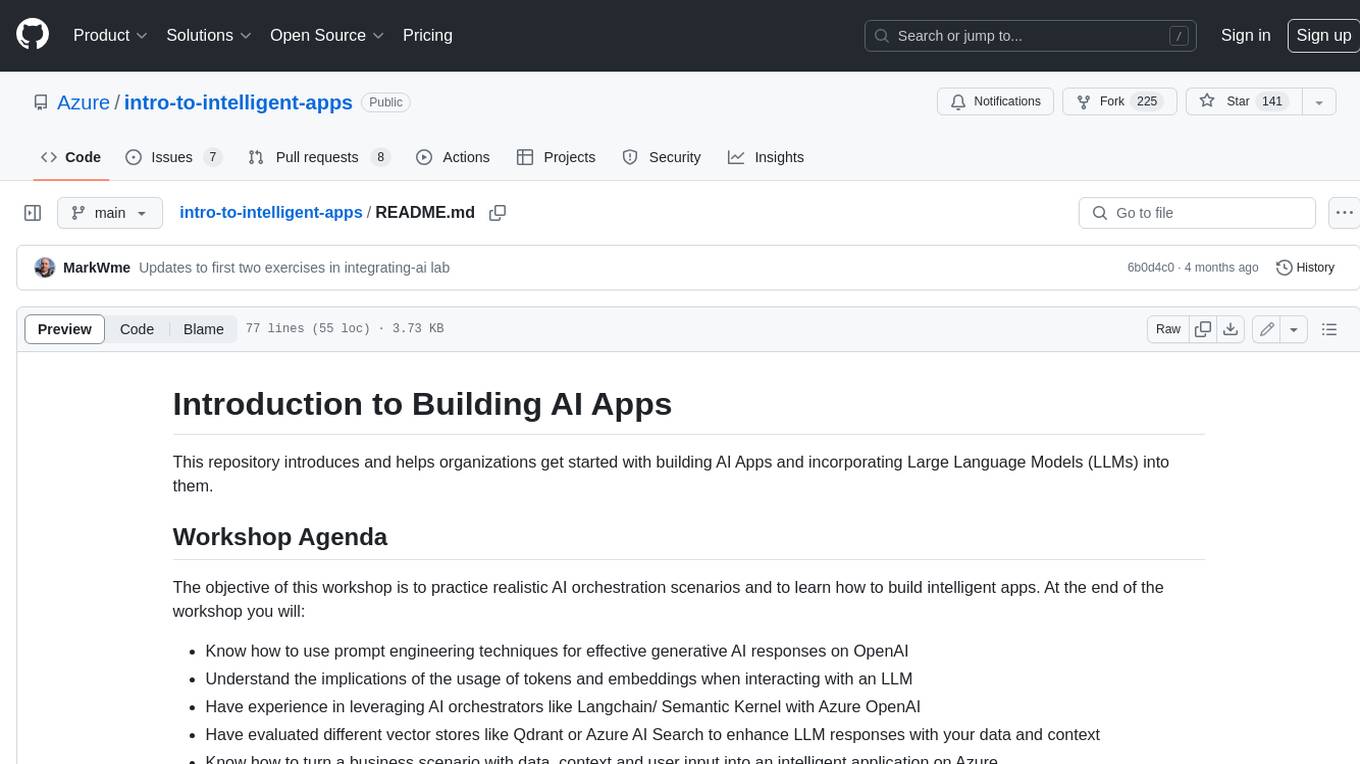
intro-to-intelligent-apps
This repository introduces and helps organizations get started with building AI Apps and incorporating Large Language Models (LLMs) into them. The workshop covers topics such as prompt engineering, AI orchestration, and deploying AI apps. Participants will learn how to use Azure OpenAI, Langchain/ Semantic Kernel, Qdrant, and Azure AI Search to build intelligent applications.
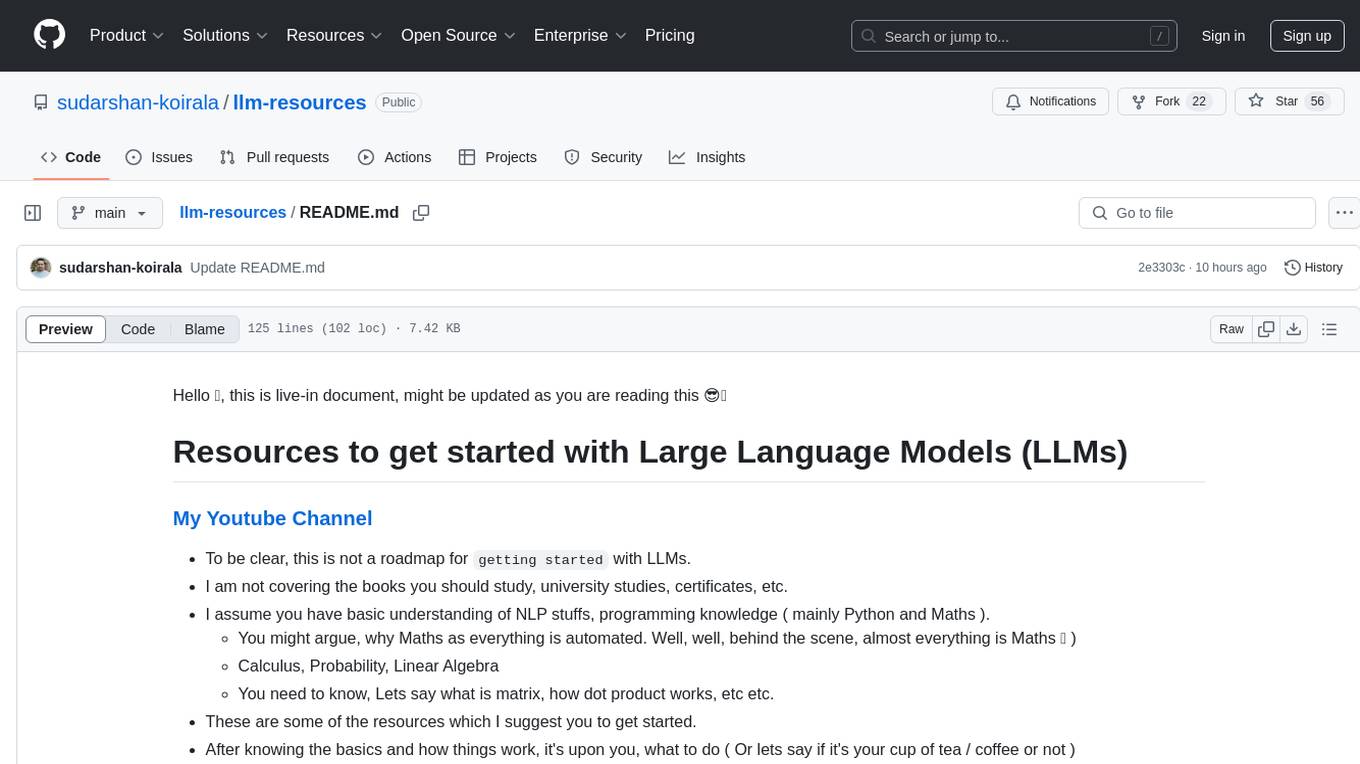
llm-resources
llm-resources is a repository providing resources to get started with Large Language Models (LLMs). It includes videos on Neural Networks and LLMs, free courses, prompt engineering guides, explored frameworks, AI assistants, and tips on making RAG work properly. The repository also contains important links and updates related to LLMs, AWS, RAG, agents, model context protocol, and more. It aims to help individuals with a basic understanding of NLP and programming knowledge to explore and utilize LLMs effectively.

langwatch
LangWatch is a monitoring and analytics platform designed to track, visualize, and analyze interactions with Large Language Models (LLMs). It offers real-time telemetry to optimize LLM cost and latency, a user-friendly interface for deep insights into LLM behavior, user analytics for engagement metrics, detailed debugging capabilities, and guardrails to monitor LLM outputs for issues like PII leaks and toxic language. The platform supports OpenAI and LangChain integrations, simplifying the process of tracing LLM calls and generating API keys for usage. LangWatch also provides documentation for easy integration and self-hosting options for interested users.
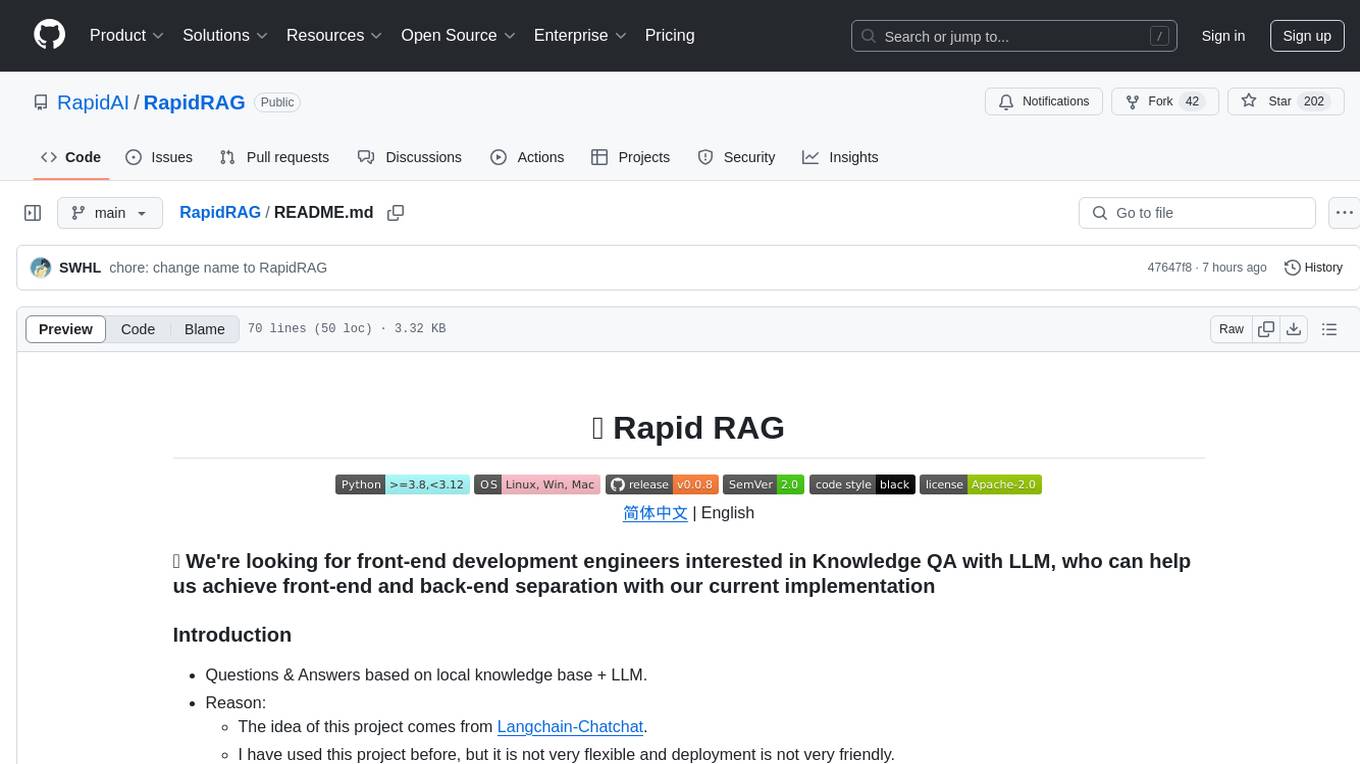
RapidRAG
RapidRAG is a project focused on Knowledge QA with LLM, combining Questions & Answers based on local knowledge base with a large language model. The project aims to provide a flexible and deployment-friendly solution for building a knowledge question answering system. It is modularized, allowing easy replacement of parts and simple code understanding. The tool supports various document formats and can utilize CPU for most parts, with the large language model interface requiring separate deployment.
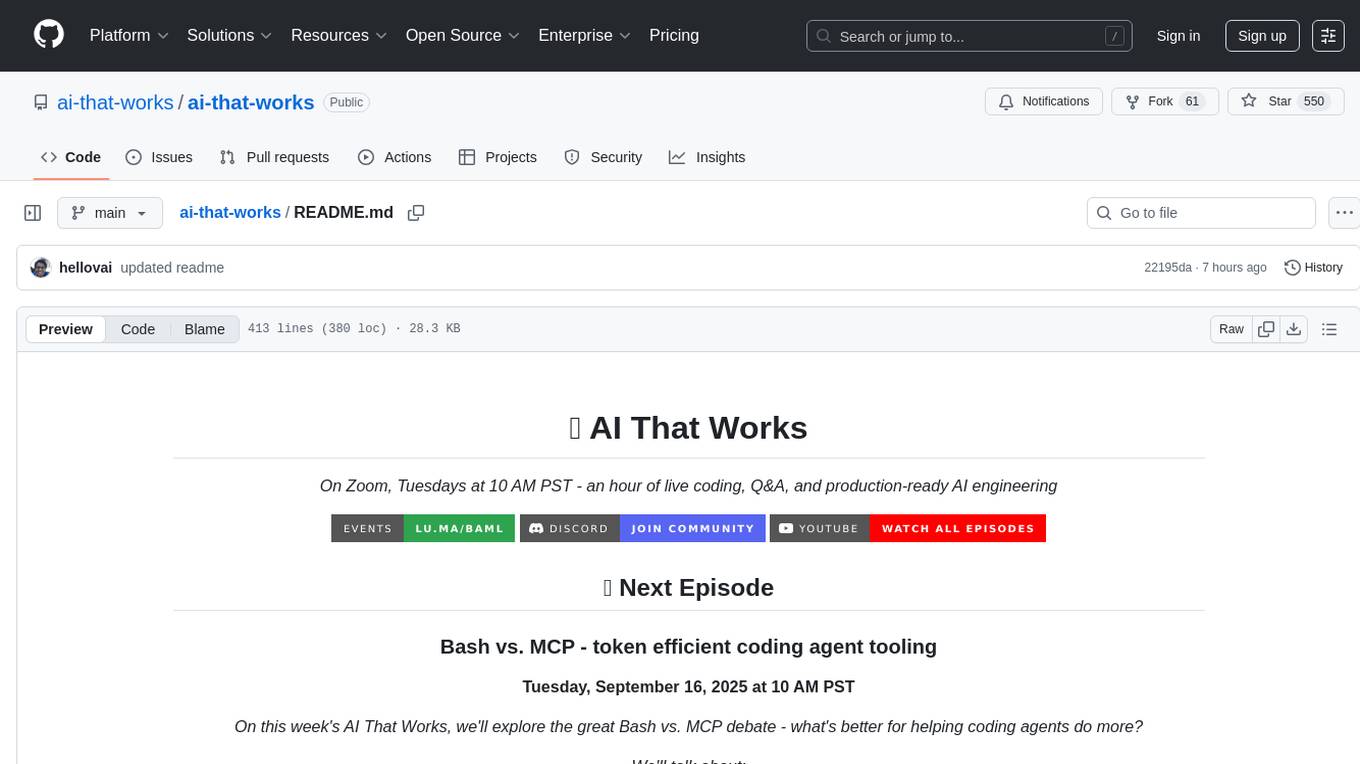
ai-that-works
AI That Works is a weekly live coding event focused on exploring advanced AI engineering techniques and tools to take AI applications from demo to production. The sessions cover topics such as token efficiency, downsides of JSON, writing drop-ins for coding agents, and advanced tricks like .shims for coding tools. The event aims to help participants get the most out of today's AI models and tools through live coding, Q&A sessions, and production-ready insights.

OpenDAN-Personal-AI-OS
OpenDAN is an open source Personal AI OS that consolidates various AI modules for personal use. It empowers users to create powerful AI agents like assistants, tutors, and companions. The OS allows agents to collaborate, integrate with services, and control smart devices. OpenDAN offers features like rapid installation, AI agent customization, connectivity via Telegram/Email, building a local knowledge base, distributed AI computing, and more. It aims to simplify life by putting AI in users' hands. The project is in early stages with ongoing development and future plans for user and kernel mode separation, home IoT device control, and an official OpenDAN SDK release.
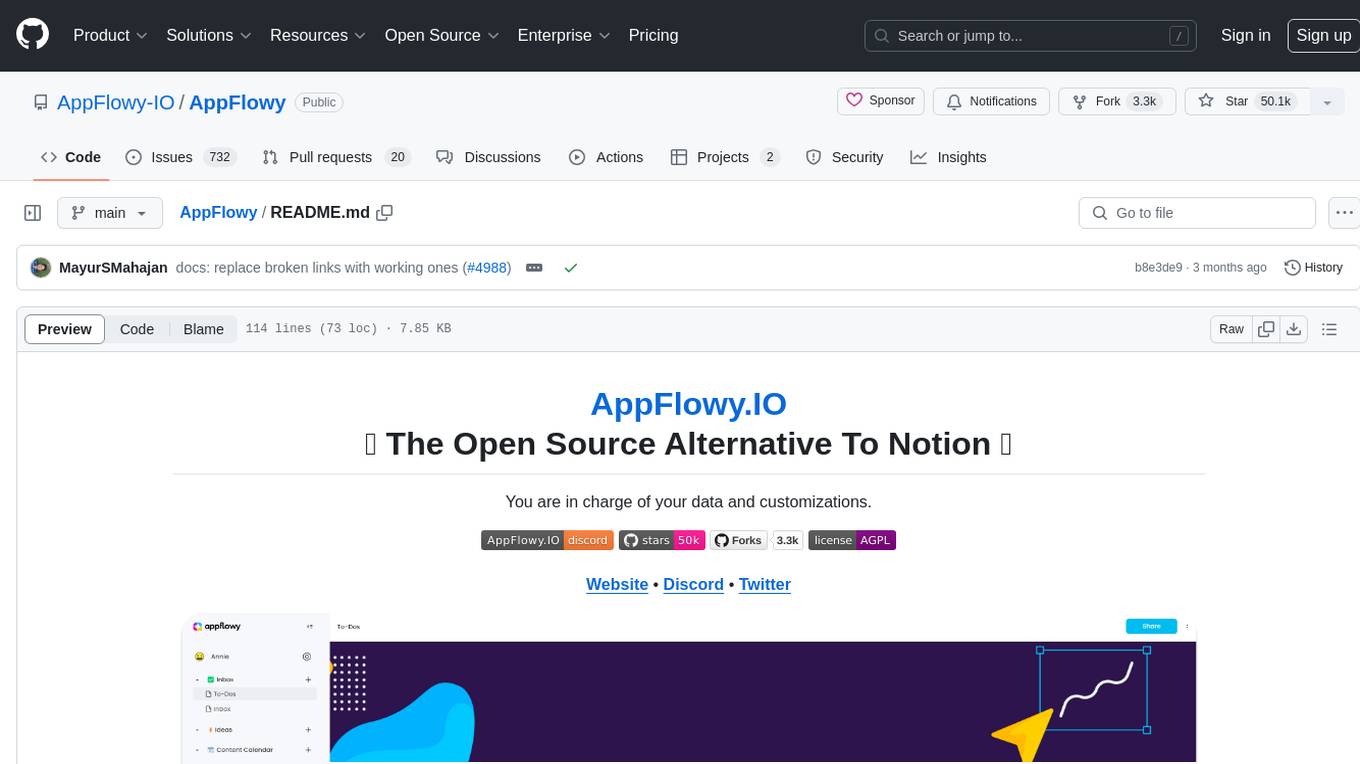
AppFlowy
AppFlowy.IO is an open-source alternative to Notion, providing users with control over their data and customizations. It aims to offer functionality, data security, and cross-platform native experience to individuals, as well as building blocks and collaboration infra services to enterprises and hackers. The tool is built with Flutter and Rust, supporting multiple platforms and emphasizing long-term maintainability. AppFlowy prioritizes data privacy, reliable native experience, and community-driven extensibility, aiming to democratize the creation of complex workplace management tools.

mindsdb
MindsDB is a platform for customizing AI from enterprise data. You can create, serve, and fine-tune models in real-time from your database, vector store, and application data. MindsDB "enhances" SQL syntax with AI capabilities to make it accessible for developers worldwide. With MindsDB’s nearly 200 integrations, any developer can create AI customized for their purpose, faster and more securely. Their AI systems will constantly improve themselves — using companies’ own data, in real-time.

morphik-core
Morphik is an AI-native toolset designed to help developers integrate context into their AI applications by providing tools to store, represent, and search unstructured data. It offers features such as multimodal search, fast metadata extraction, and integrations with existing tools. Morphik aims to address the challenges of traditional AI approaches that struggle with visually rich documents and provide a more comprehensive solution for understanding and processing complex data.
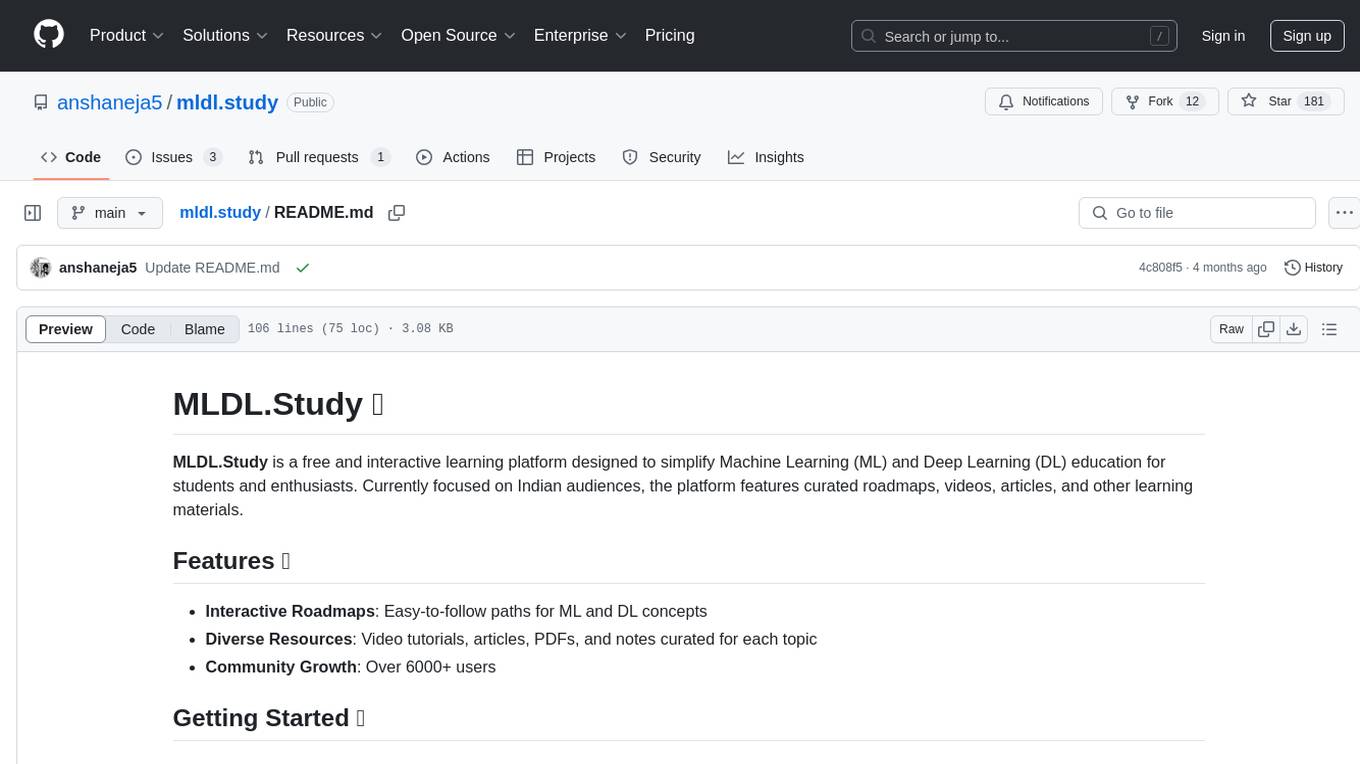
mldl.study
MLDL.Study is a free interactive learning platform focused on simplifying Machine Learning (ML) and Deep Learning (DL) education for students and enthusiasts. It features curated roadmaps, videos, articles, and other learning materials. The platform aims to provide a comprehensive learning experience for Indian audiences, with easy-to-follow paths for ML and DL concepts, diverse resources including video tutorials and articles, and a growing community of over 6000 users. Contributors can add new resources following specific guidelines to maintain quality and relevance. Future plans include expanding content for global learners, introducing a Python programming roadmap, and creating roadmaps for fields like Generative AI and Reinforcement Learning.
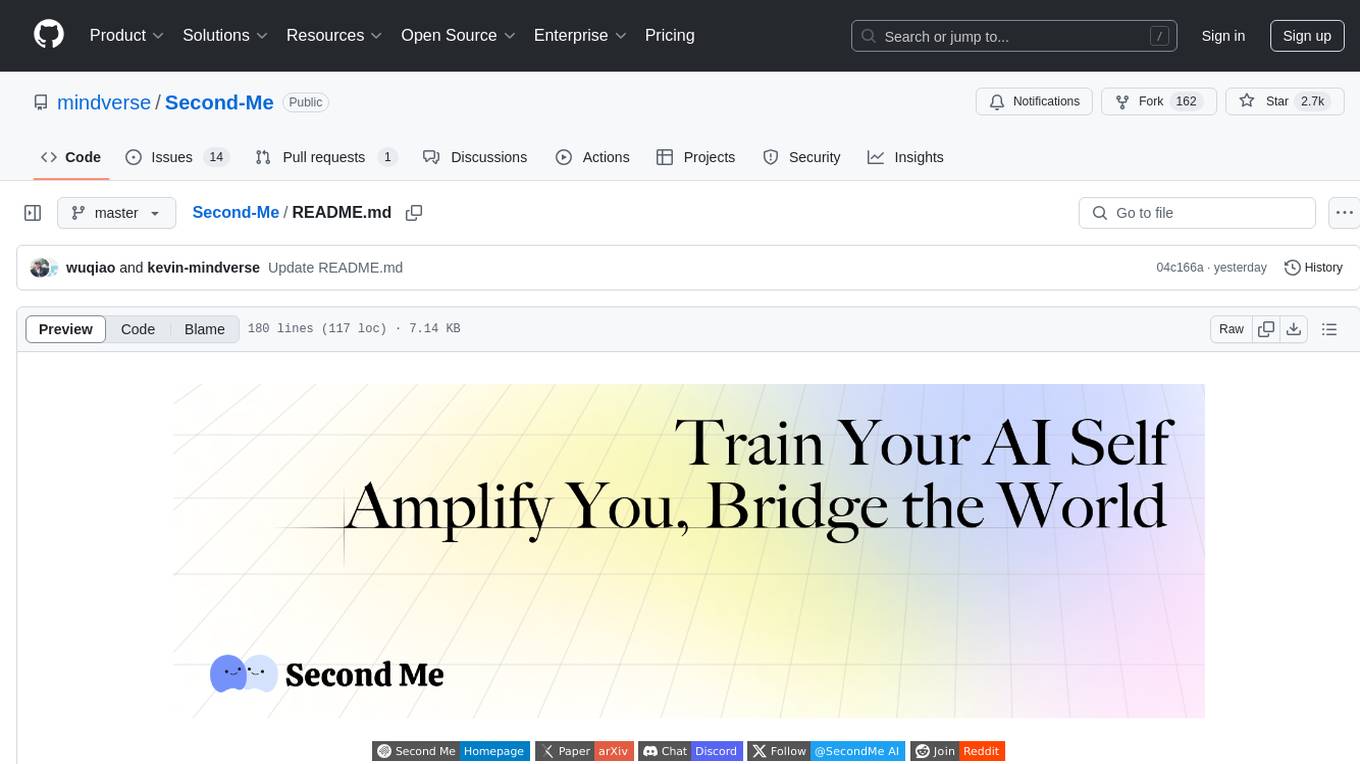
Second-Me
Second Me is an open-source prototype that allows users to craft their own AI self, preserving their identity, context, and interests. It is locally trained and hosted, yet globally connected, scaling intelligence across an AI network. It serves as an AI identity interface, fostering collaboration among AI selves and enabling the development of native AI apps. The tool prioritizes individuality and privacy, ensuring that user information and intelligence remain local and completely private.
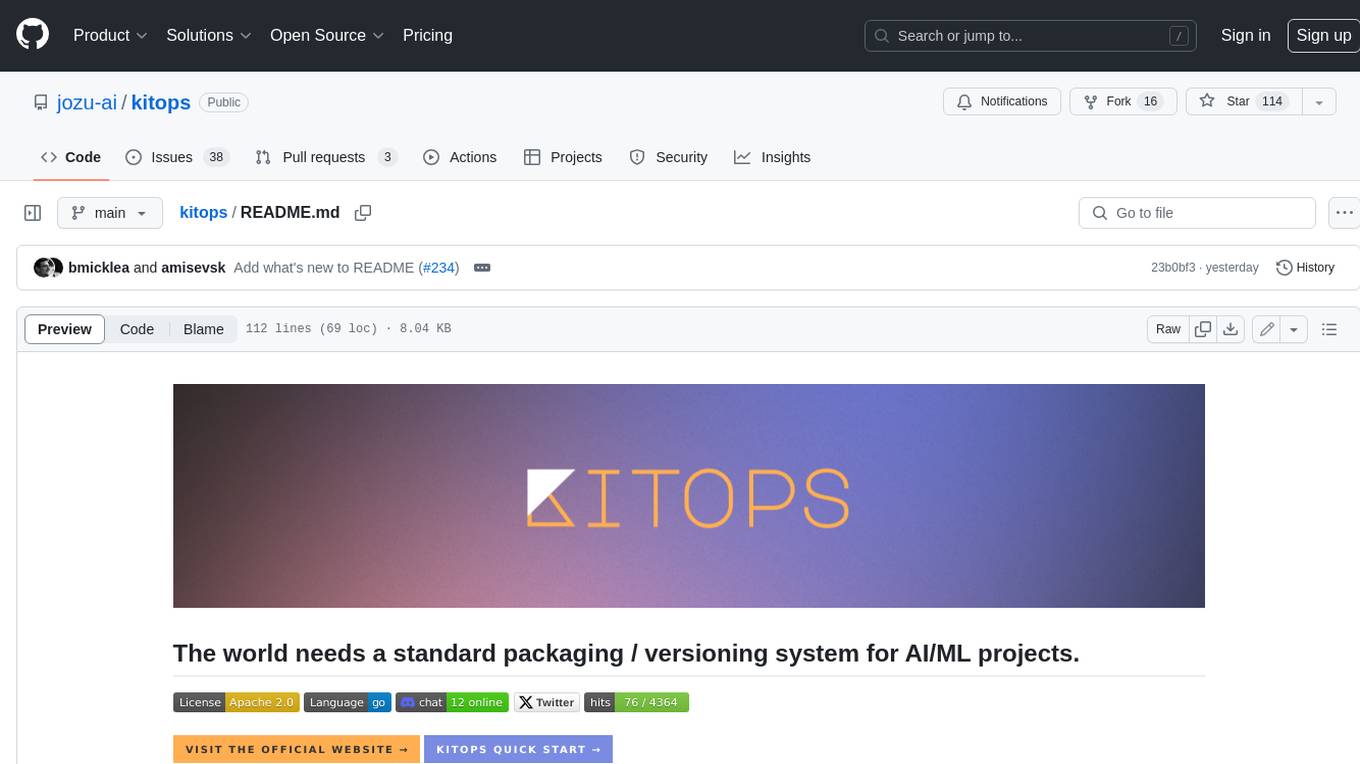
kitops
KitOps is a packaging and versioning system for AI/ML projects that uses open standards so it works with the AI/ML, development, and DevOps tools you are already using. KitOps simplifies the handoffs between data scientists, application developers, and SREs working with LLMs and other AI/ML models. KitOps' ModelKits are a standards-based package for models, their dependencies, configurations, and codebases. ModelKits are portable, reproducible, and work with the tools you already use.
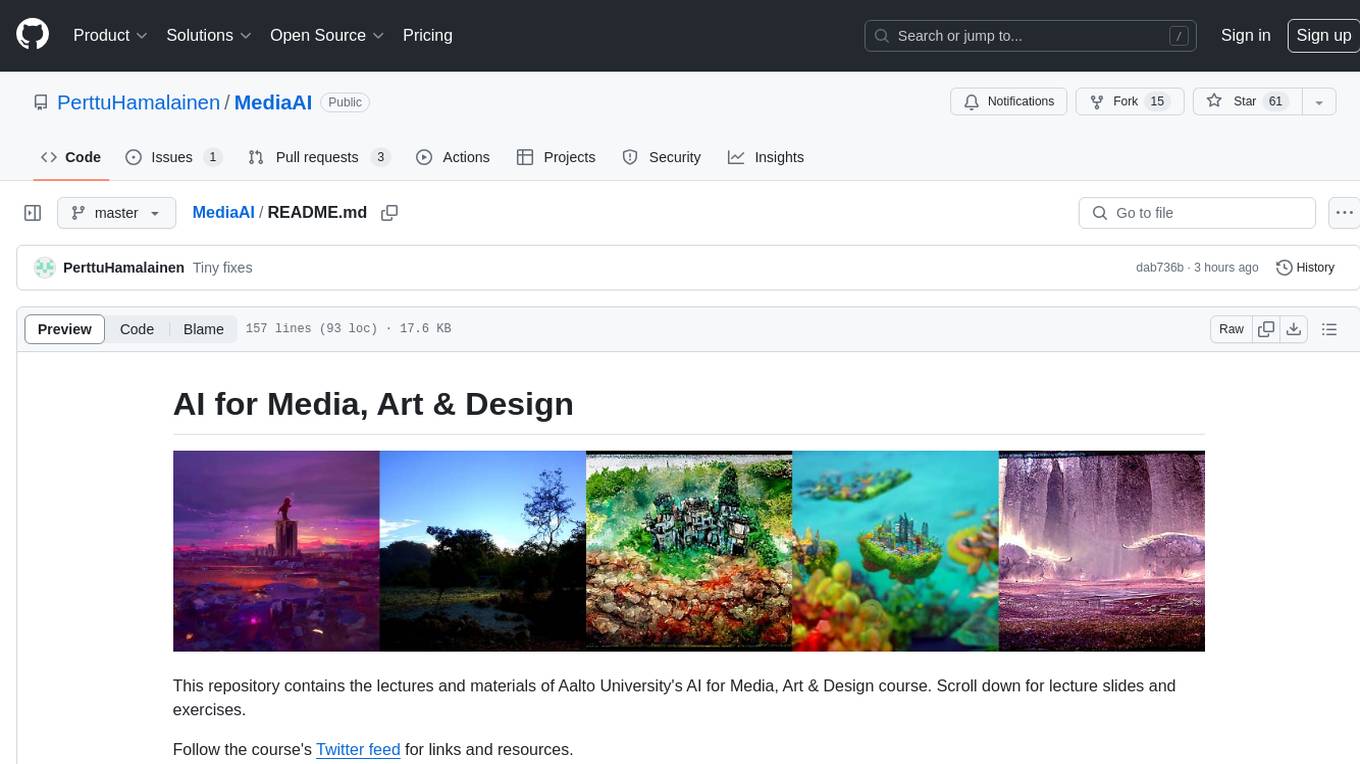
MediaAI
MediaAI is a repository containing lectures and materials for Aalto University's AI for Media, Art & Design course. The course is a hands-on, project-based crash course focusing on deep learning and AI techniques for artists and designers. It covers common AI algorithms & tools, their applications in art, media, and design, and provides hands-on practice in designing, implementing, and using these tools. The course includes lectures, exercises, and a final project based on students' interests. Students can complete the course without programming by creatively utilizing existing tools like ChatGPT and DALL-E. The course emphasizes collaboration, peer-to-peer tutoring, and project-based learning. It covers topics such as text generation, image generation, optimization, and game AI.
For similar tasks

llmops-duke-aipi
LLMOps Duke AIPI is a course focused on operationalizing Large Language Models, teaching methodologies for developing applications using software development best practices with large language models. The course covers various topics such as generative AI concepts, setting up development environments, interacting with large language models, using local large language models, applied solutions with LLMs, extensibility using plugins and functions, retrieval augmented generation, introduction to Python web frameworks for APIs, DevOps principles, deploying machine learning APIs, LLM platforms, and final presentations. Students will learn to build, share, and present portfolios using Github, YouTube, and Linkedin, as well as develop non-linear life-long learning skills. Prerequisites include basic Linux and programming skills, with coursework available in Python or Rust. Additional resources and references are provided for further learning and exploration.
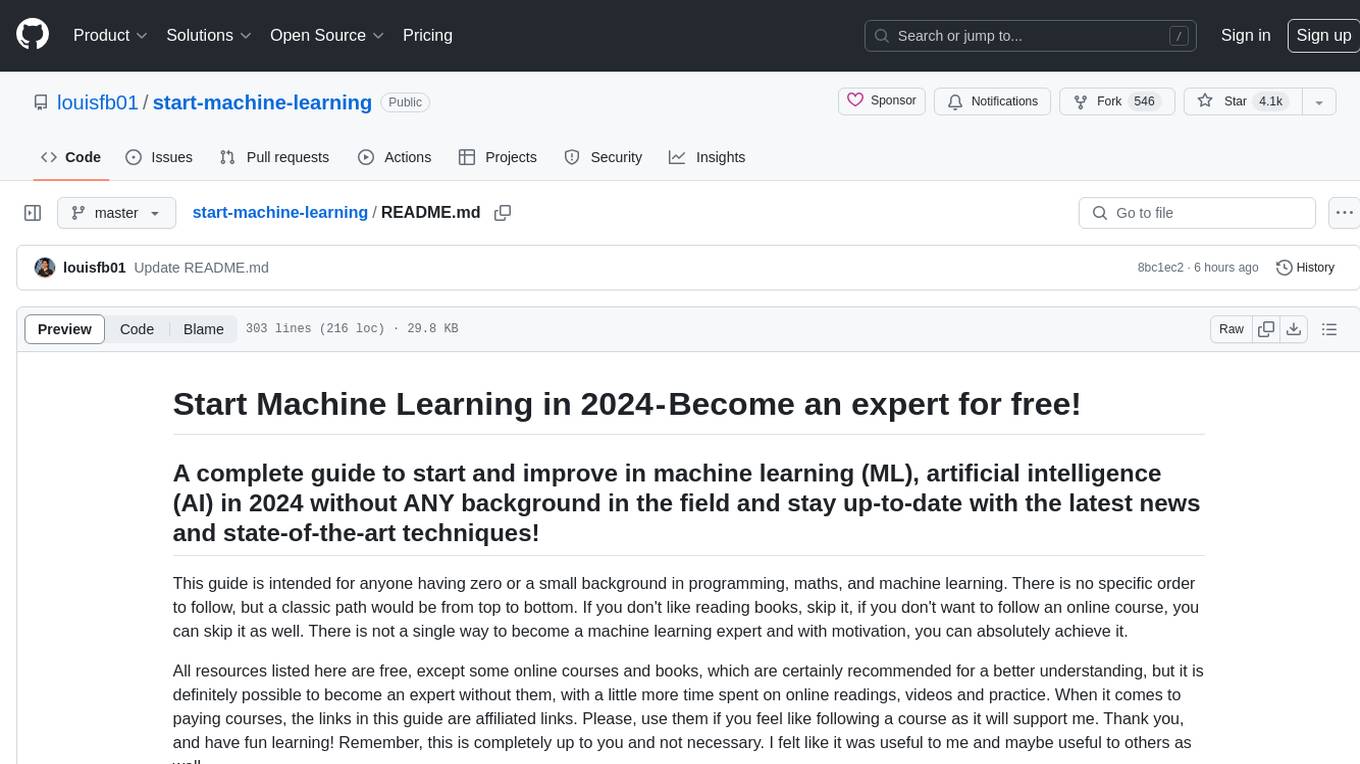
start-machine-learning
Start Machine Learning in 2024 is a comprehensive guide for beginners to advance in machine learning and artificial intelligence without any prior background. The guide covers various resources such as free online courses, articles, books, and practical tips to become an expert in the field. It emphasizes self-paced learning and provides recommendations for learning paths, including videos, podcasts, and online communities. The guide also includes information on building language models and applications, practicing through Kaggle competitions, and staying updated with the latest news and developments in AI. The goal is to empower individuals with the knowledge and resources to excel in machine learning and AI.
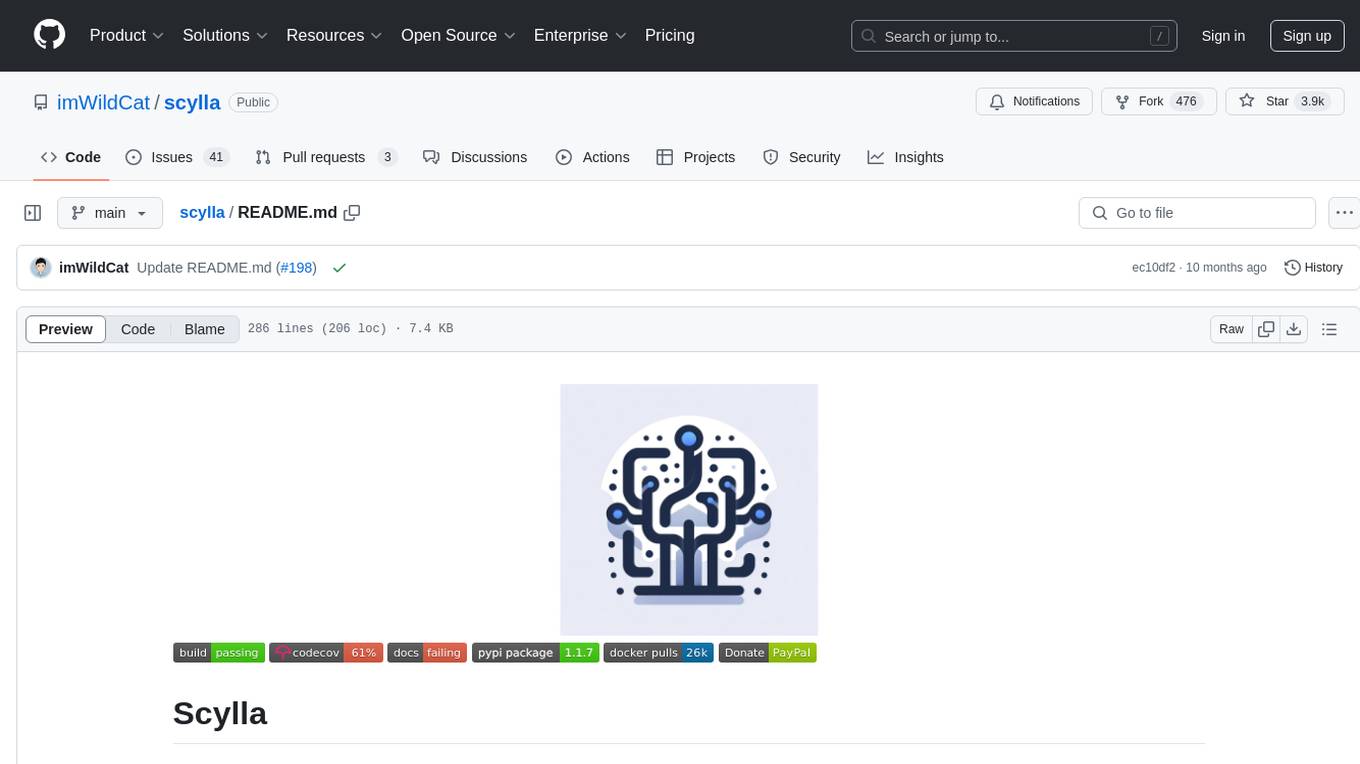
scylla
Scylla is an intelligent proxy pool tool designed for humanities, enabling users to extract content from the internet and build their own Large Language Models in the AI era. It features automatic proxy IP crawling and validation, an easy-to-use JSON API, a simple web-based user interface, HTTP forward proxy server, Scrapy and requests integration, and headless browser crawling. Users can start using Scylla with just one command, making it a versatile tool for various web scraping and content extraction tasks.
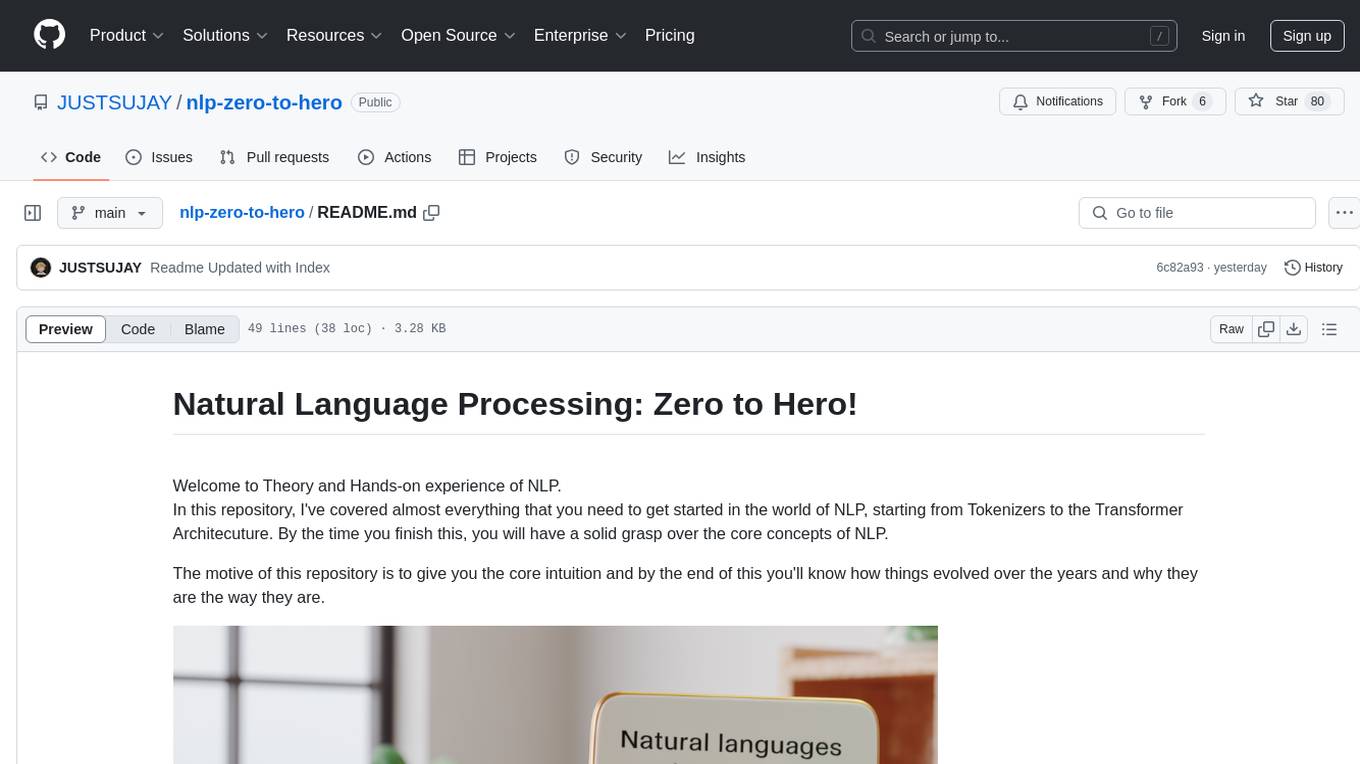
nlp-zero-to-hero
This repository provides a comprehensive guide to Natural Language Processing (NLP), covering topics from Tokenization to Transformer Architecture. It aims to equip users with a solid understanding of NLP concepts, evolution, and core intuition. The repository includes practical examples and hands-on experience to facilitate learning and exploration in the field of NLP.
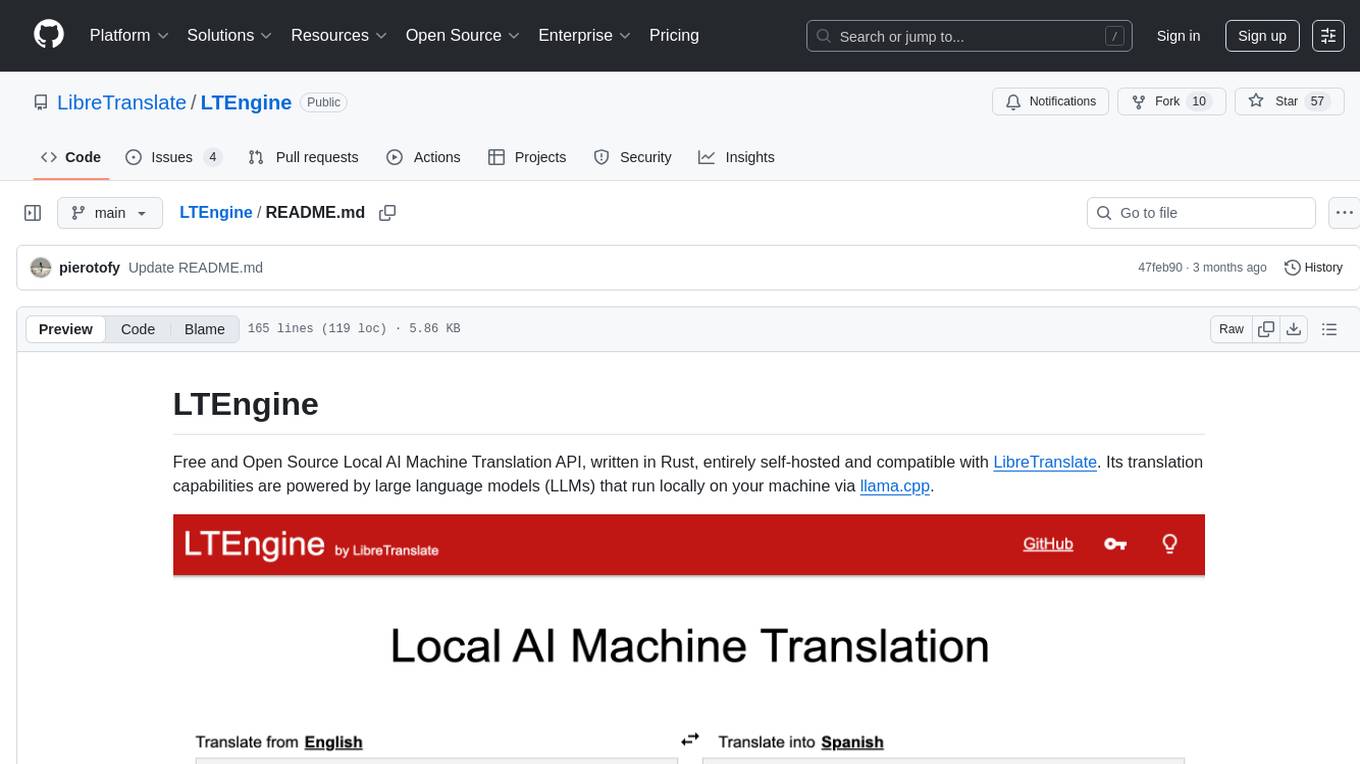
LTEngine
LTEngine is a free and open-source local AI machine translation API written in Rust. It is self-hosted and compatible with LibreTranslate. LTEngine utilizes large language models (LLMs) via llama.cpp, offering high-quality translations that rival or surpass DeepL for certain languages. It supports various accelerators like CUDA, Metal, and Vulkan, with the largest model 'gemma3-27b' fitting on a single consumer RTX 3090. LTEngine is actively developed, with a roadmap outlining future enhancements and features.
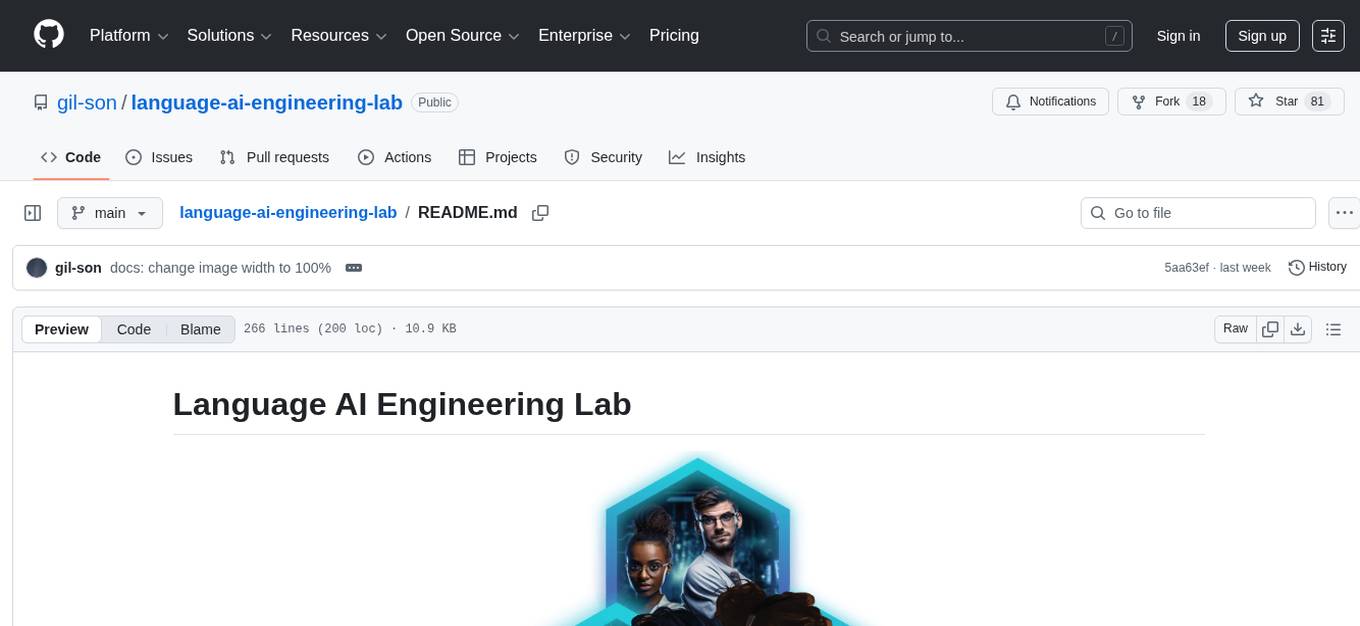
language-ai-engineering-lab
The Language AI Engineering Lab is a structured repository focusing on Generative AI, guiding users from language fundamentals to production-ready Language AI systems. It covers topics like NLP, Transformers, Large Language Models, and offers hands-on learning paths, practical implementations, and end-to-end projects. The repository includes in-depth concepts, diagrams, code examples, and videos to support learning. It also provides learning objectives for various areas of Language AI engineering, such as NLP, Transformers, LLM training, prompt engineering, context management, RAG pipelines, context engineering, evaluation, model context protocol, LLM orchestration, agentic AI systems, multimodal models, MLOps, LLM data engineering, and domain applications like IVR and voice systems.

zep-python
Zep is an open-source platform for building and deploying large language model (LLM) applications. It provides a suite of tools and services that make it easy to integrate LLMs into your applications, including chat history memory, embedding, vector search, and data enrichment. Zep is designed to be scalable, reliable, and easy to use, making it a great choice for developers who want to build LLM-powered applications quickly and easily.
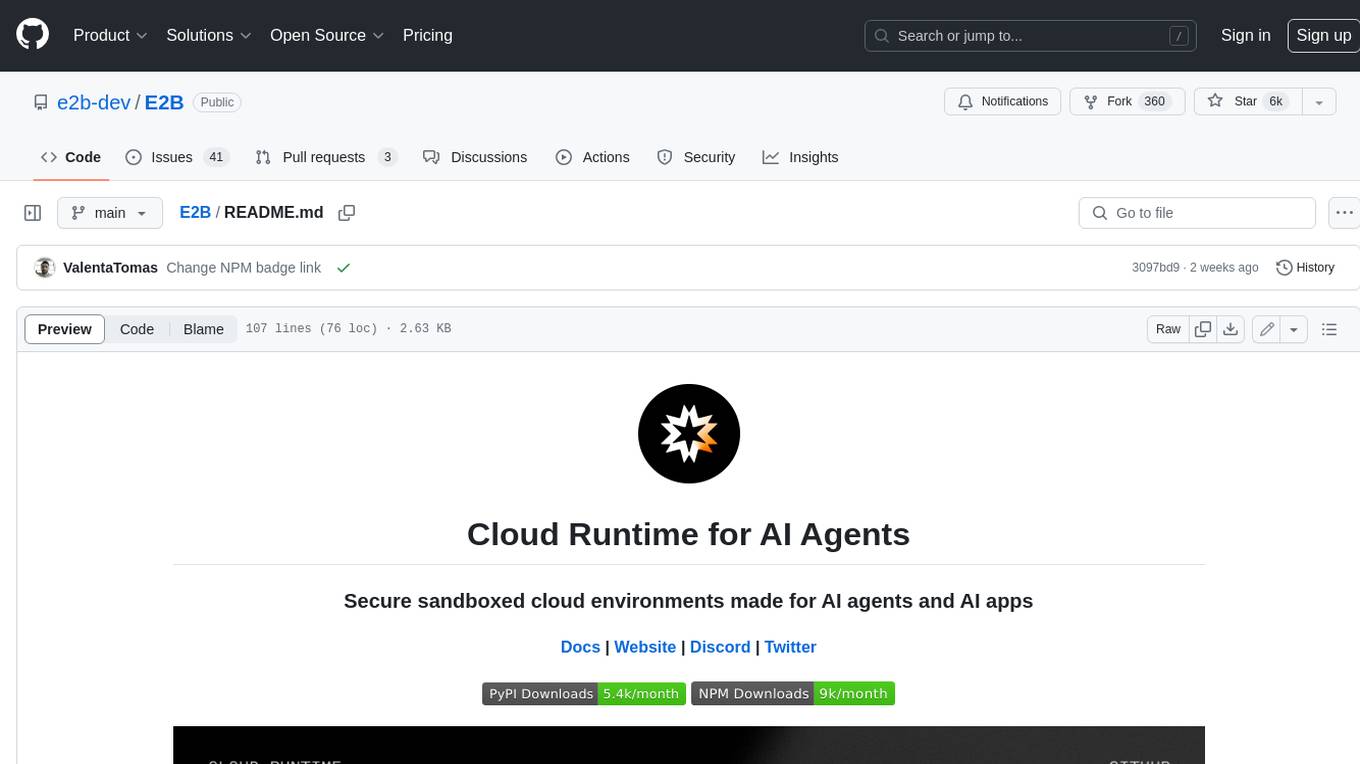
E2B
E2B Sandbox is a secure sandboxed cloud environment made for AI agents and AI apps. Sandboxes allow AI agents and apps to have long running cloud secure environments. In these environments, large language models can use the same tools as humans do. For example: * Cloud browsers * GitHub repositories and CLIs * Coding tools like linters, autocomplete, "go-to defintion" * Running LLM generated code * Audio & video editing The E2B sandbox can be connected to any LLM and any AI agent or app.
For similar jobs
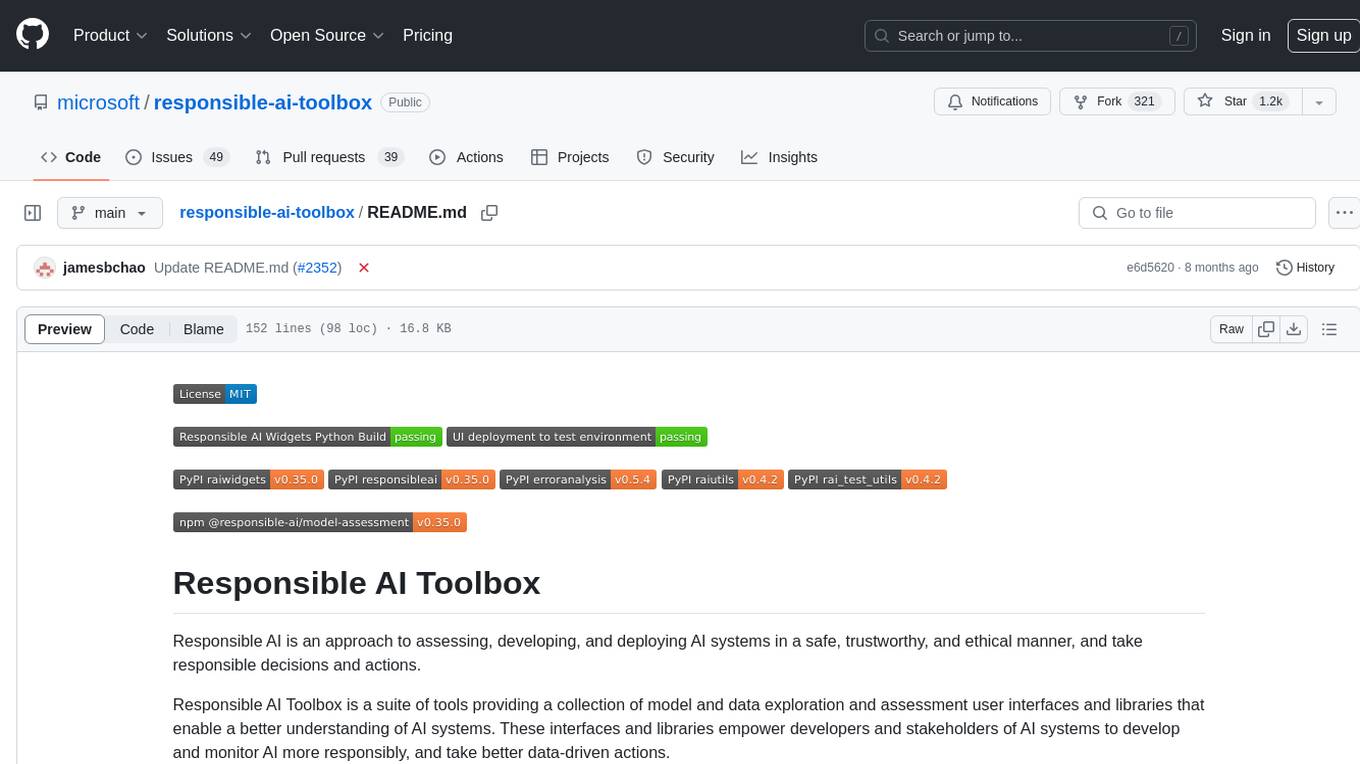
responsible-ai-toolbox
Responsible AI Toolbox is a suite of tools providing model and data exploration and assessment interfaces and libraries for understanding AI systems. It empowers developers and stakeholders to develop and monitor AI responsibly, enabling better data-driven actions. The toolbox includes visualization widgets for model assessment, error analysis, interpretability, fairness assessment, and mitigations library. It also offers a JupyterLab extension for managing machine learning experiments and a library for measuring gender bias in NLP datasets.
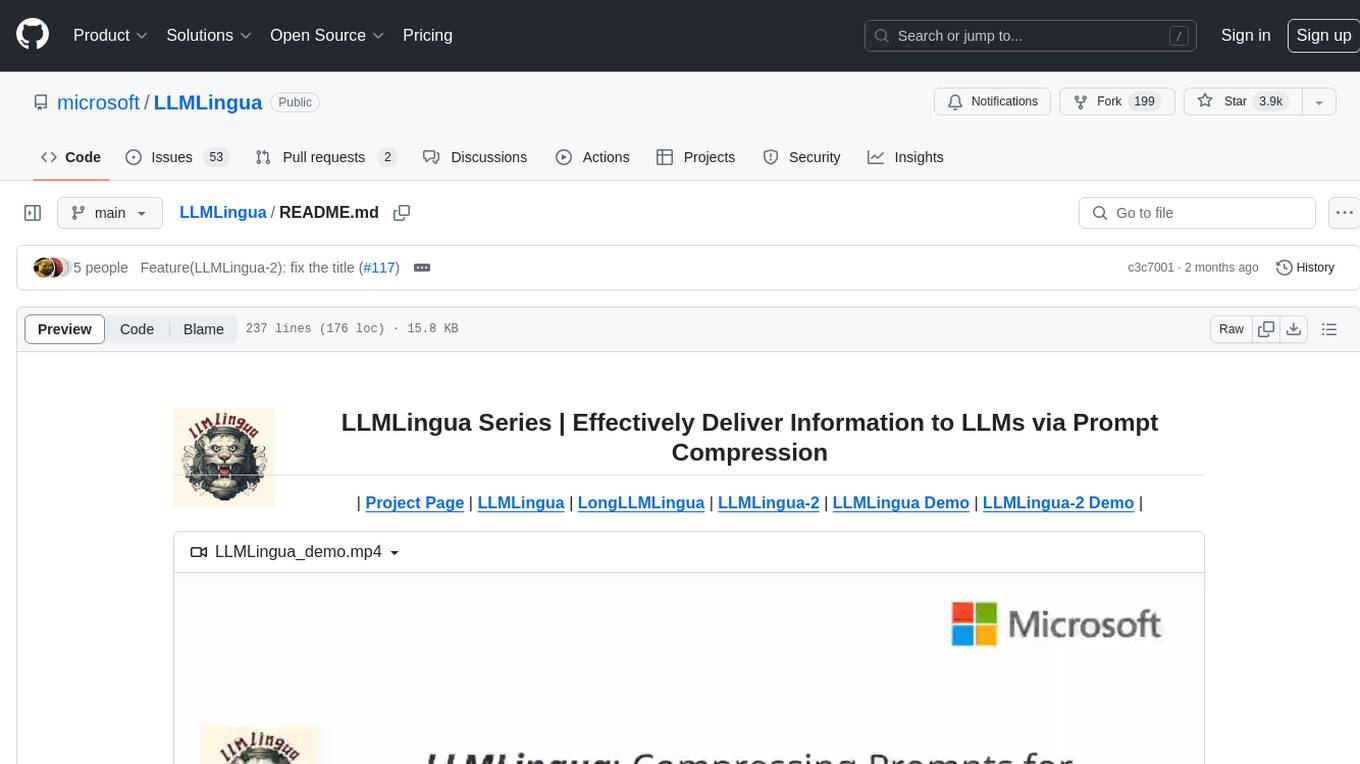
LLMLingua
LLMLingua is a tool that utilizes a compact, well-trained language model to identify and remove non-essential tokens in prompts. This approach enables efficient inference with large language models, achieving up to 20x compression with minimal performance loss. The tool includes LLMLingua, LongLLMLingua, and LLMLingua-2, each offering different levels of prompt compression and performance improvements for tasks involving large language models.
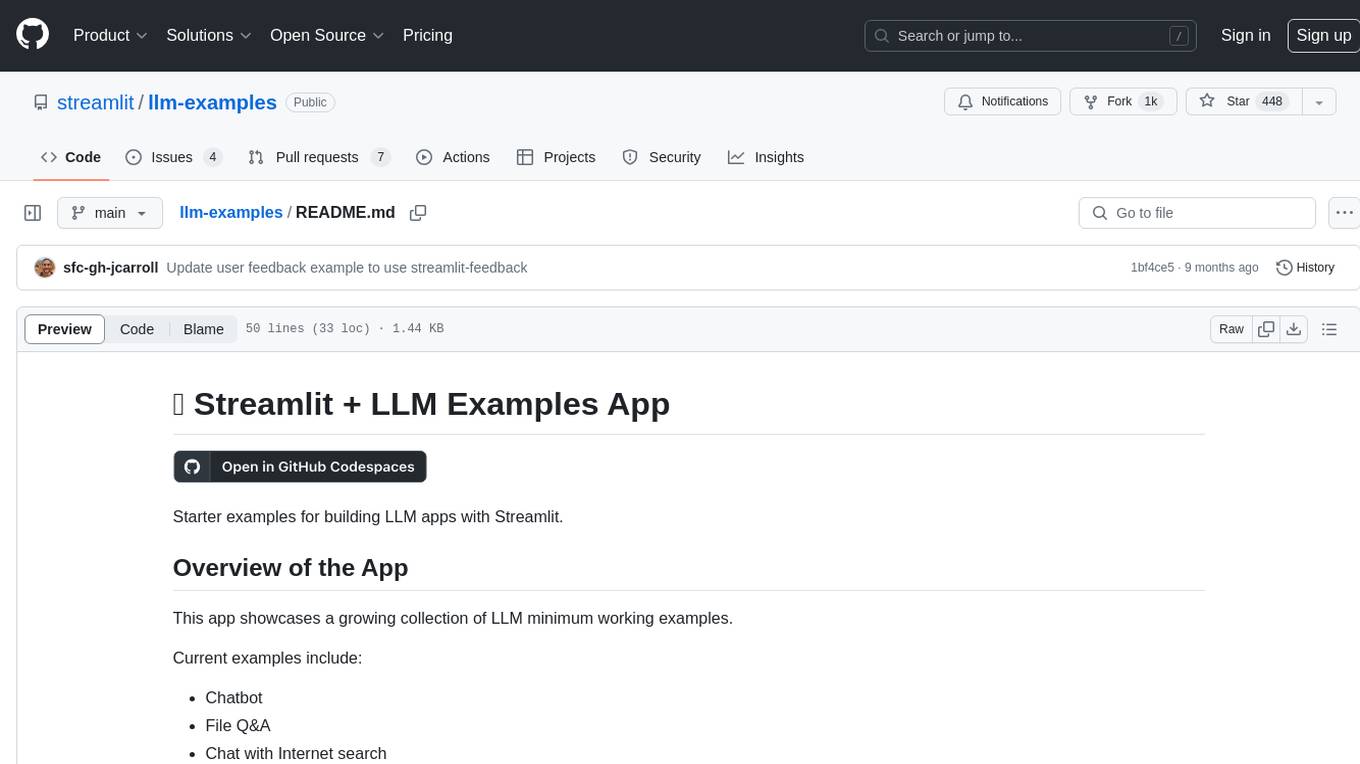
llm-examples
Starter examples for building LLM apps with Streamlit. This repository showcases a growing collection of LLM minimum working examples, including a Chatbot, File Q&A, Chat with Internet search, LangChain Quickstart, LangChain PromptTemplate, and Chat with user feedback. Users can easily get their own OpenAI API key and set it as an environment variable in Streamlit apps to run the examples locally.

LMOps
LMOps is a research initiative focusing on fundamental research and technology for building AI products with foundation models, particularly enabling AI capabilities with Large Language Models (LLMs) and Generative AI models. The project explores various aspects such as prompt optimization, longer context handling, LLM alignment, acceleration of LLMs, LLM customization, and understanding in-context learning. It also includes tools like Promptist for automatic prompt optimization, Structured Prompting for efficient long-sequence prompts consumption, and X-Prompt for extensible prompts beyond natural language. Additionally, LLMA accelerators are developed to speed up LLM inference by referencing and copying text spans from documents. The project aims to advance technologies that facilitate prompting language models and enhance the performance of LLMs in various scenarios.
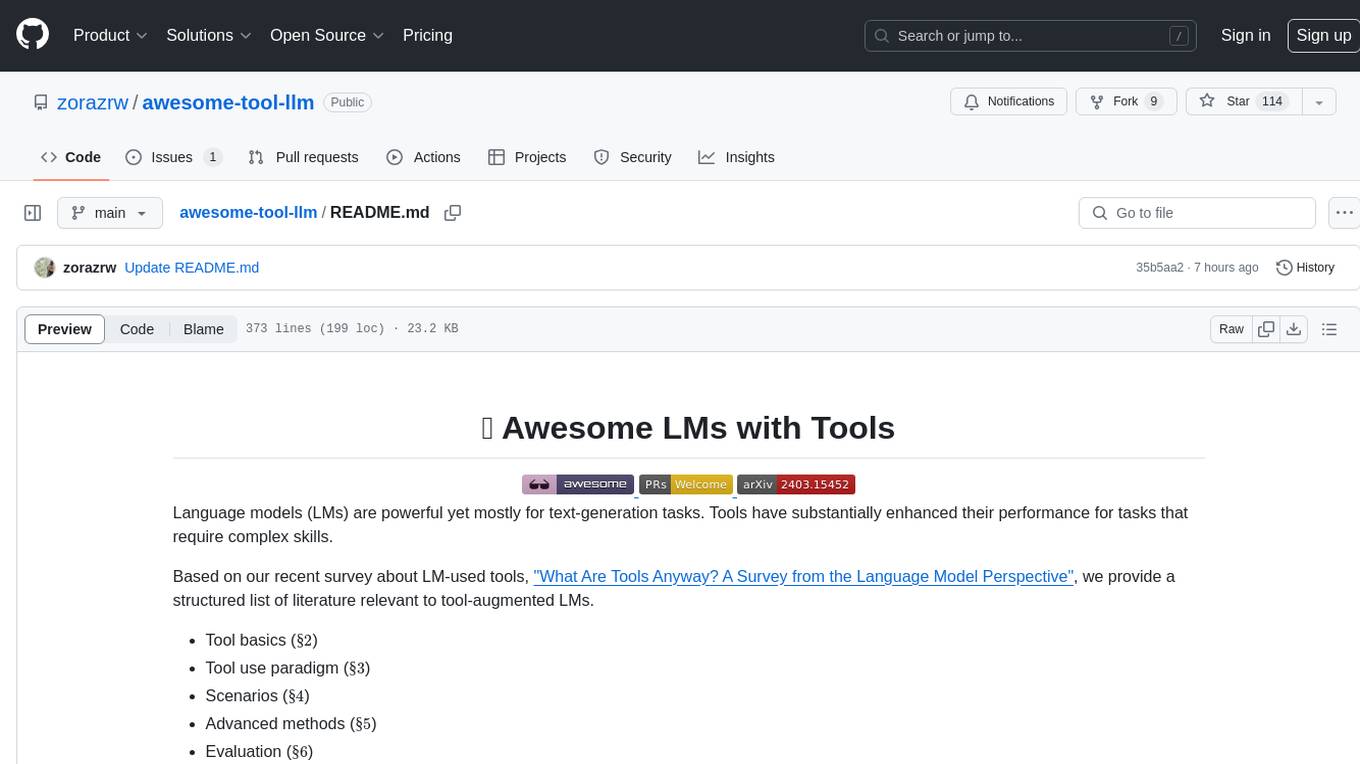
awesome-tool-llm
This repository focuses on exploring tools that enhance the performance of language models for various tasks. It provides a structured list of literature relevant to tool-augmented language models, covering topics such as tool basics, tool use paradigm, scenarios, advanced methods, and evaluation. The repository includes papers, preprints, and books that discuss the use of tools in conjunction with language models for tasks like reasoning, question answering, mathematical calculations, accessing knowledge, interacting with the world, and handling non-textual modalities.
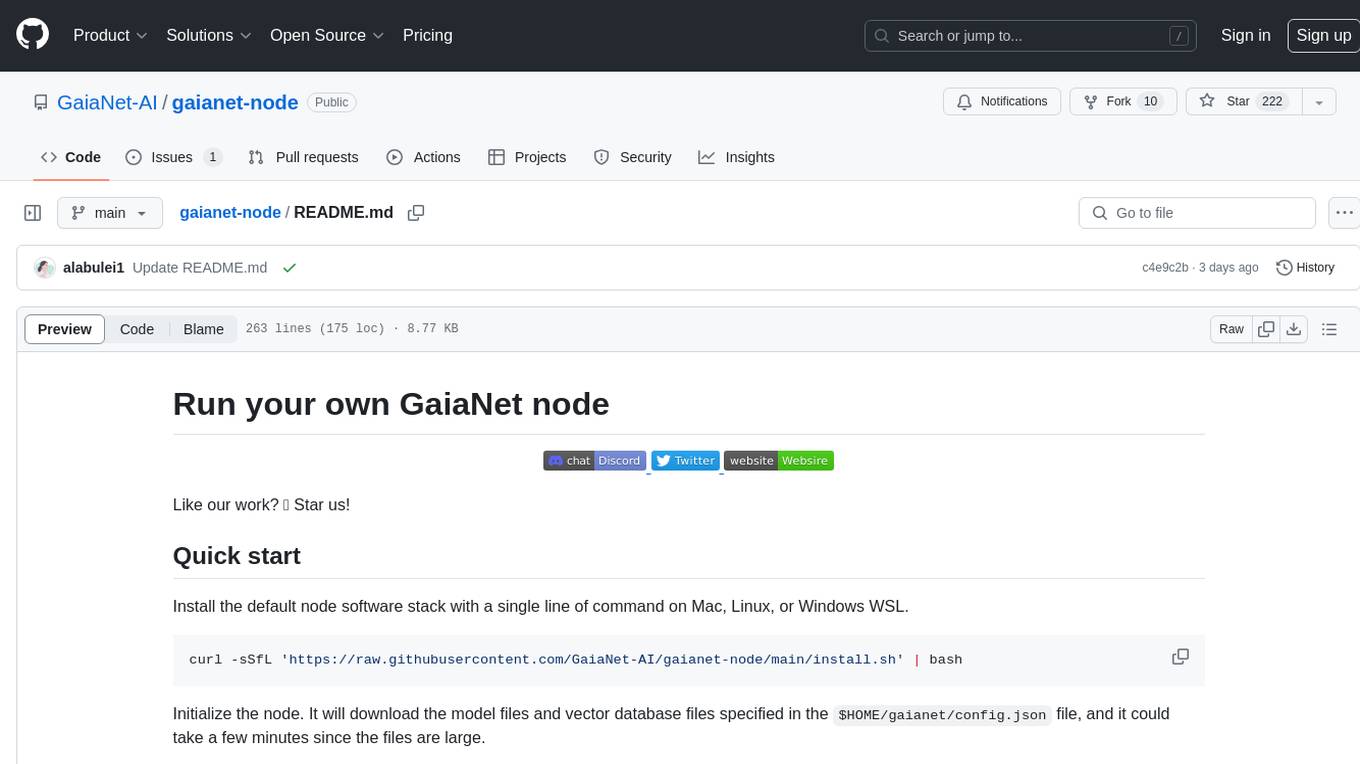
gaianet-node
GaiaNet-node is a tool that allows users to run their own GaiaNet node, enabling them to interact with an AI agent. The tool provides functionalities to install the default node software stack, initialize the node with model files and vector database files, start the node, stop the node, and update configurations. Users can use pre-set configurations or pass a custom URL for initialization. The tool is designed to facilitate communication with the AI agent and access node information via a browser. GaiaNet-node requires sudo privilege for installation but can also be installed without sudo privileges with specific commands.

llmops-duke-aipi
LLMOps Duke AIPI is a course focused on operationalizing Large Language Models, teaching methodologies for developing applications using software development best practices with large language models. The course covers various topics such as generative AI concepts, setting up development environments, interacting with large language models, using local large language models, applied solutions with LLMs, extensibility using plugins and functions, retrieval augmented generation, introduction to Python web frameworks for APIs, DevOps principles, deploying machine learning APIs, LLM platforms, and final presentations. Students will learn to build, share, and present portfolios using Github, YouTube, and Linkedin, as well as develop non-linear life-long learning skills. Prerequisites include basic Linux and programming skills, with coursework available in Python or Rust. Additional resources and references are provided for further learning and exploration.
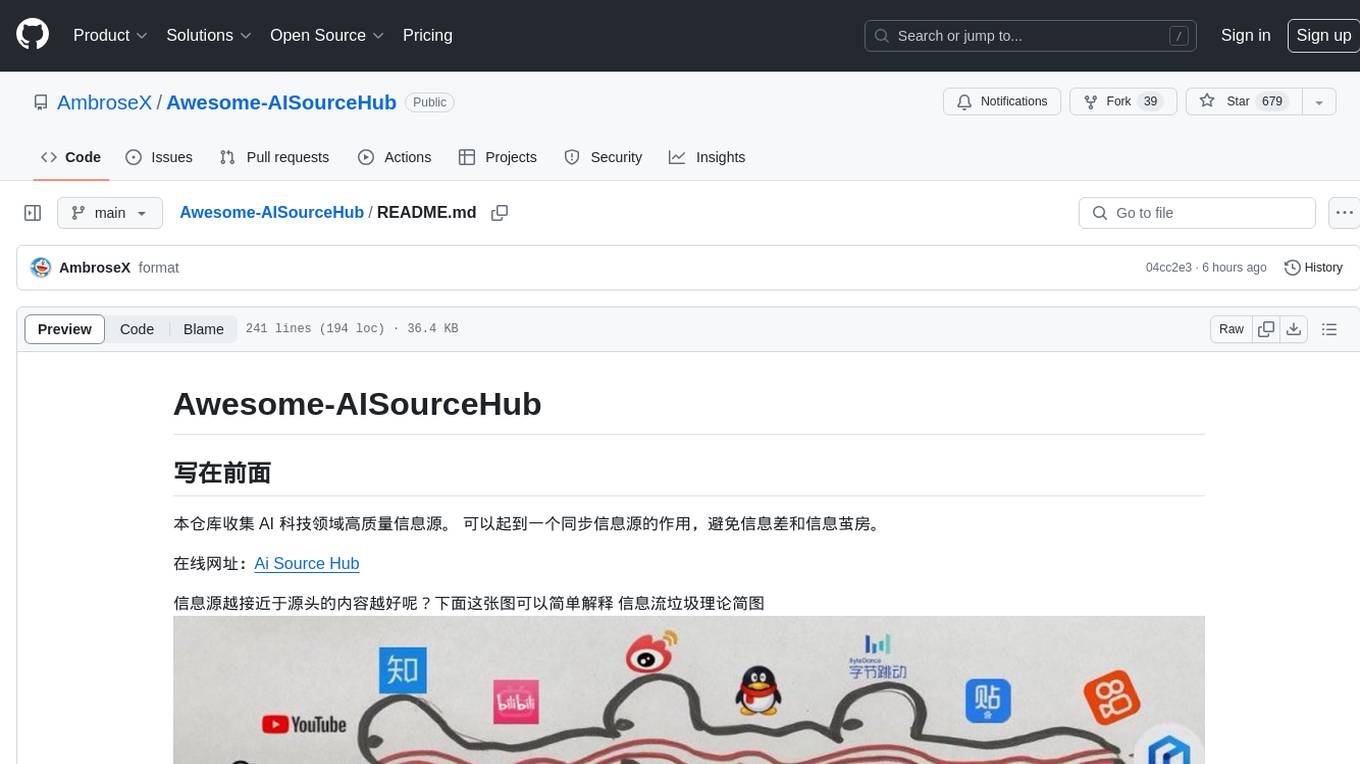
Awesome-AISourceHub
Awesome-AISourceHub is a repository that collects high-quality information sources in the field of AI technology. It serves as a synchronized source of information to avoid information gaps and information silos. The repository aims to provide valuable resources for individuals such as AI book authors, enterprise decision-makers, and tool developers who frequently use Twitter to share insights and updates related to AI advancements. The platform emphasizes the importance of accessing information closer to the source for better quality content. Users can contribute their own high-quality information sources to the repository by following specific steps outlined in the contribution guidelines. The repository covers various platforms such as Twitter, public accounts, knowledge planets, podcasts, blogs, websites, YouTube channels, and more, offering a comprehensive collection of AI-related resources for individuals interested in staying updated with the latest trends and developments in the AI field.